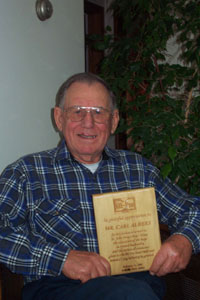By Margie Wuebker
mwuebker@dailystandard.com ST. HENRY -- Carl Albers shakes his head recalling a visit more than a decade ago to a ramshackle pig barn at St. John Bosco Children's Home near Mandeville, Jamaica.

Sister Susan Frazer, superintendent of the children's home that houses more than 150 boys between the ages of 4 and 17, dreamed of establishing a swine operation to generate needed income while providing an educational experience for the residents. Turning a dream into reality proved to be more difficult than she imagined.
"I could not believe what I saw," the semi-retired farmer says. "There were 11-month-old pigs weighing just 160 pounds and none of the males had been castrated. Sows raised an average of three pigs per year and the three boars on the property had become disabled. They were of no use whatsoever."
By comparison, pigs in Albers' Mercer County hog operation reached a market weight of approximately 200 to 220 pounds in just six to seven months. The castration process, typically done within 10 days of birth, assured the meat would not have a strange flavor or odor due to hormones.
"What I saw was anything but a dream," says Albers, who learned of the facility's need from Mercer County resident Ed Werling, who also has made several trips to Jamaica. "It was a downright nightmare like stepping back into bygone times." Efforts to purchase replacement boars proved rather eventful with a guide driving a four-wheel pickup truck and taking Albers to places no white man had visited. They managed to purchase three after considerable haggling on Frazer's part.
With no stock trailer, the men used bed springs as sideboards and loaded the new acquisitions with the help of a gravel pile. Several men pushed the uncooperative animals toward the truck while others pulled them on board.
"It took 11ò2 hours to go 30 miles," the 72-year-old Albers says. "And there were six men in the back keeping the boars apart without individual pens."
Albers made three trips to Jamaica the first year and many more during the ensuing years. A new crisis awaited each time.
"People there were under the impression any kind of feed could be used," he says. "And the meat showed the result with tenderloins the size of dollar coins. There was nothing to the hams and shoulders."
After prime breeding stock ended up in the butcher shop repeatedly, Albers threw up his hands in frustration and vowed not to return. Frazer pleaded for one more chance and Albers relented.
He later met Dr. Greg Smith, a veterinarian from New Zealand who shared Frazer's dream for a poultry operation. Smith invested a year of his time at St. John Bosco, consulting with Albers via telephone during that time. Smith even spent a week checking out Albers' hog operation, now run by son Albert.
The surroundings gradually improved as did the livestock. Welded crates replaced old rabbits hutches as farrowing pens. Heating pads warded off the cold and dampness that once claimed the lives of many piglets.
Plans were made to replace the ramshackle building, which stood at the bottom of a hill, meaning piglets often drowned in times of heavy rain. First came a 122-by-160-foot farrowing barn and nursery, followed two years later by another barn of similar dimensions. It houses the finishing operation where hogs remain until butchering time.
"I once preached how it took time and effort to build an operation that would provide a steady source of meat for the butcher shop," he says. "At first Sister Susan and the others could not see that far into the future. Now they do."
A biogas digester has replaced the old collection area where school boys once bucketed out excess manure. The new arrangement uses the methane gas byproduct to heat both hog barns and provide a source of cooking fuel for the school and its related catering business.
Albers and his wife, Alvira, returned to Jamaica last month. She immediately went to the sewing machine where stacks of projects waited, and he headed to the piggery. For the first time in a decade, he found no problems.
"The difference between then and now is amazing," he says with a proud smile. "I would not hesitate to put St. John Bosco hogs against any here in this country."
From its humble beginnings, the swine operation has become the biggest on the island with more than 400 pigs. Homeless, orphaned and troubled youths at the home are assigned jobs. With hogs as well as 6,000 chickens, numerous cows and goats and large vegetable gardens, there are more than enough opportunities to learn a trade.
Albers' dedication recently was recognized with an award from Hi Pro Feeds honoring his service to the school, the education of boys in animal husbandry and the pig industry of Jamaica.
"I didn't expect anything like this," he says modestly. "I believe God sends us where we are needed most and in my case that happened to be Jamaica." |

